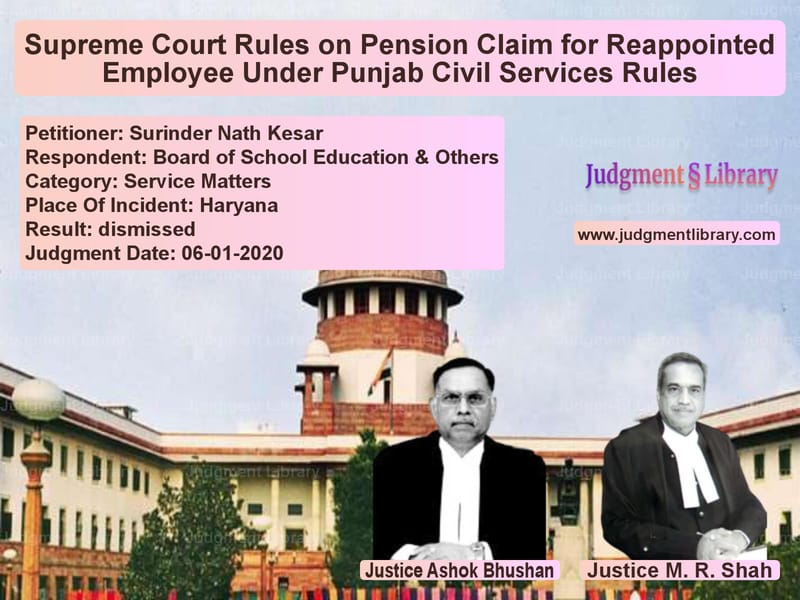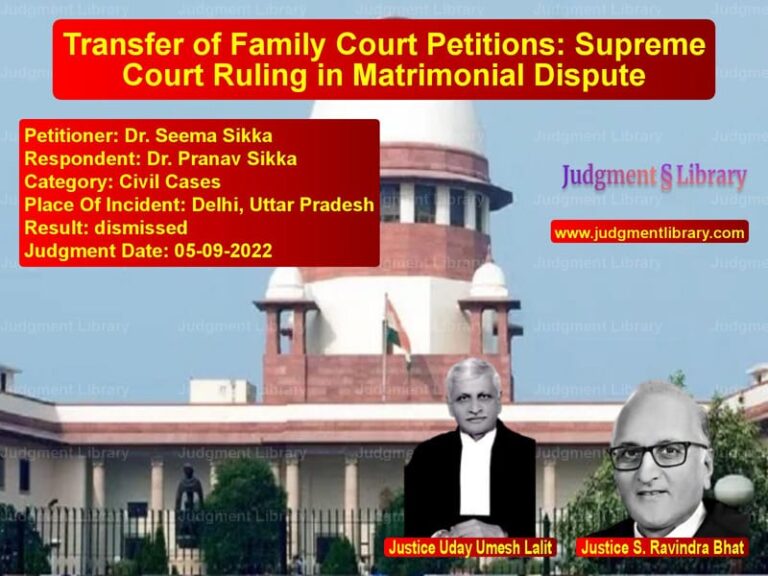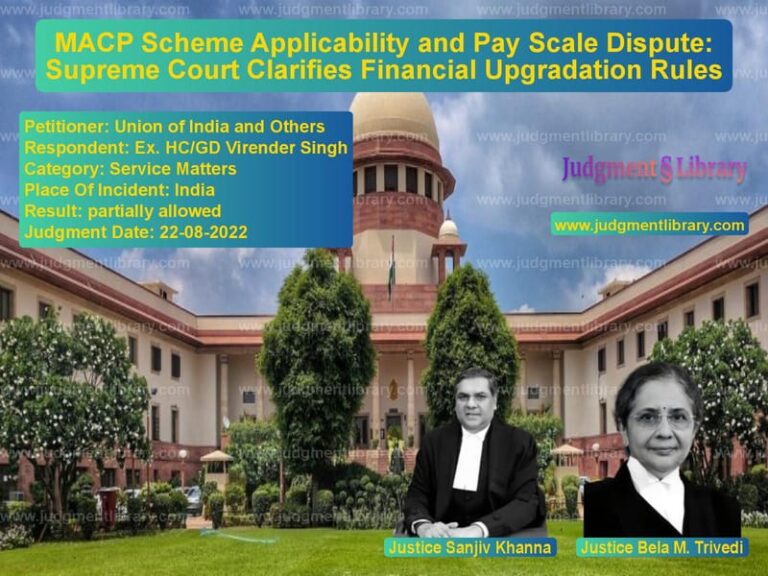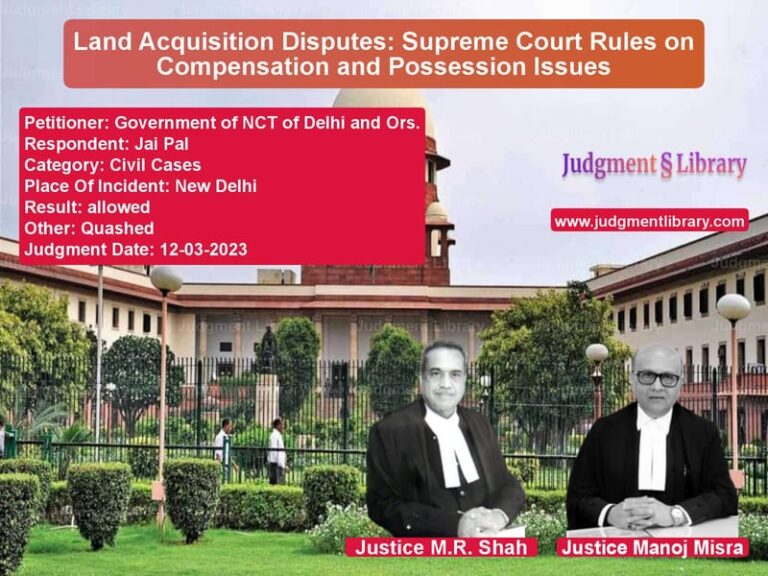Supreme Court Rules on Pension Claim for Reappointed Employee Under Punjab Civil Services Rules
The case of Surinder Nath Kesar vs. Board of School Education & Others was a crucial ruling concerning pension benefits under the Punjab Civil Services Rules. The Supreme Court had to decide whether an employee who voluntarily retired and was later reappointed was entitled to have his service period treated as continuous for pension purposes.
Background of the Case
The appellant, Surinder Nath Kesar, was initially appointed as a Proof Reader by the Board of School Education, Haryana, on May 8, 1970. Due to family circumstances, he voluntarily retired on February 1, 1988. Later, in response to his representation, the Education Minister of Haryana recommended his reappointment, and the Board reappointed him as a Proof Reader on July 25, 1994, with effect from August 3, 1994.
The dispute arose when the appellant sought to have his past service counted towards pension benefits, arguing that the break between his voluntary retirement and reappointment should be condoned. The Board initially condoned the break in service and treated it as leave without pay. However, the Haryana Finance Department later objected, stating that under Rule 4.23 of the Punjab Civil Services Rules, only a one-year interruption could be condoned, whereas the appellant had a six-year gap.
Arguments by the Petitioner
The appellant, Surinder Nath Kesar, presented the following arguments:
- His voluntary retirement did not amount to resignation, dismissal, or removal, and therefore, should not disqualify him from pension benefits under Rule 4.23.
- The Board had initially condoned his break in service and allowed him to deposit previously withdrawn provident fund, gratuity, and leave encashment.
- Since the Board had already passed a resolution for his service continuity, the Finance Department’s objection should not apply.
- The rejection of his pension claim was arbitrary and ignored past precedents.
Arguments by the Respondent
The respondents, including the Haryana Government, countered with the following arguments:
- Rule 4.23 of the Punjab Civil Services Rules only allowed condonation of an interruption in service of up to one year.
- The appellant had a six-year interruption, which could not be condoned under the applicable rules.
- Since the appellant’s reappointment was considered a fresh appointment, his previous service could not be counted for pension purposes.
- The Finance Department had declined to grant relaxation under Rule 4.23, and therefore, the Board’s resolution condoning the interruption was not valid.
High Court Ruling
The Punjab & Haryana High Court dismissed the appellant’s writ petition, holding that:
- Under Rule 4.23, only interruptions of up to one year could be condoned.
- Since the appellant had voluntarily retired and later rejoined, his service period could not be treated as continuous.
- The Board’s earlier resolution condoning the break was subject to approval by the Finance Department, which was not granted.
- The appellant’s claim was not supported by the applicable rules.
Supreme Court Judgment
The Supreme Court upheld the High Court’s decision, ruling against the appellant. The Court made the following key observations:
“Rule 4.23 does not permit condonation of an interruption of more than one year’s duration. Since the appellant had an interruption of more than six years, his claim for continuity in service for pension purposes cannot be granted.”
The Court further stated:
- The appellant voluntarily retired and accepted retirement benefits, making his reappointment a fresh appointment.
- Since Rule 4.23 specifically limited condonation of interruptions to one year, the appellant’s claim was not legally sustainable.
- The Finance Department’s refusal to relax the rule was valid, as the government had the discretion to grant or deny such requests.
- Even though the Board initially supported the appellant’s claim, its decision was contingent upon government approval, which was denied.
Legal Precedents Considered
The Supreme Court referred to several key rulings:
- Subedar Harpal Singh vs. State of Haryana – Confirming that pension rules must be strictly followed.
- State of Punjab vs. Amar Nath Goyal – Establishing that government employees cannot claim benefits beyond those allowed by statutory provisions.
- Union of India vs. Rakesh Kumar – Holding that pension benefits must be granted strictly according to the rules in force.
Final Outcome
The Supreme Court issued the following directives:
- The appeal was dismissed, and the High Court’s ruling was upheld.
- The appellant was not entitled to pension benefits based on his earlier service.
- The break in service from 1988 to 1994 could not be condoned beyond the one-year limit set by Rule 4.23.
- The appellant’s retirement benefits already paid were final, and no further claims would be entertained.
This judgment reaffirmed the importance of adhering to pension rules and clarified that voluntary retirement followed by reappointment constitutes a fresh appointment rather than a continuation of service.
Petitioner Name: Surinder Nath Kesar.Respondent Name: Board of School Education & Others.Judgment By: Justice Ashok Bhushan, Justice M. R. Shah.Place Of Incident: Haryana.Judgment Date: 06-01-2020.
Don’t miss out on the full details! Download the complete judgment in PDF format below and gain valuable insights instantly!
Download Judgment: Surinder Nath Kesar vs Board of School Educ Supreme Court of India Judgment Dated 06-01-2020.pdf
Direct Downlaod Judgment: Direct downlaod this Judgment
See all petitions in Pension and Gratuity
See all petitions in Public Sector Employees
See all petitions in Employment Disputes
See all petitions in Judgment by Ashok Bhushan
See all petitions in Judgment by Mukeshkumar Rasikbhai Shah
See all petitions in dismissed
See all petitions in supreme court of India judgments January 2020
See all petitions in 2020 judgments
See all posts in Service Matters Category
See all allowed petitions in Service Matters Category
See all Dismissed petitions in Service Matters Category
See all partially allowed petitions in Service Matters Category







